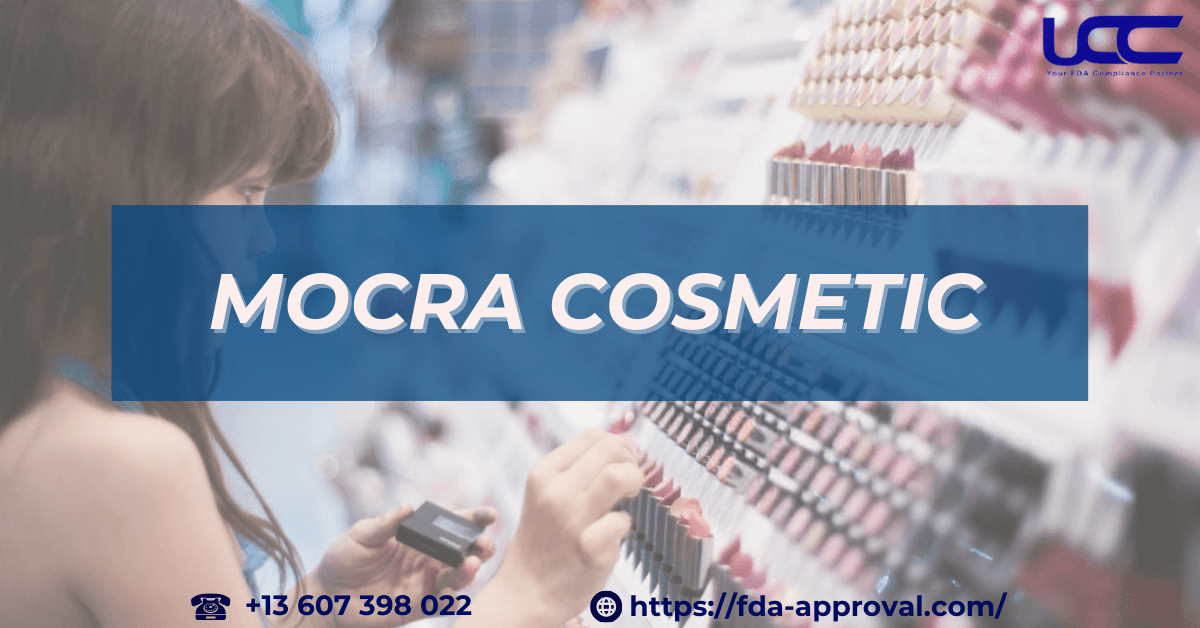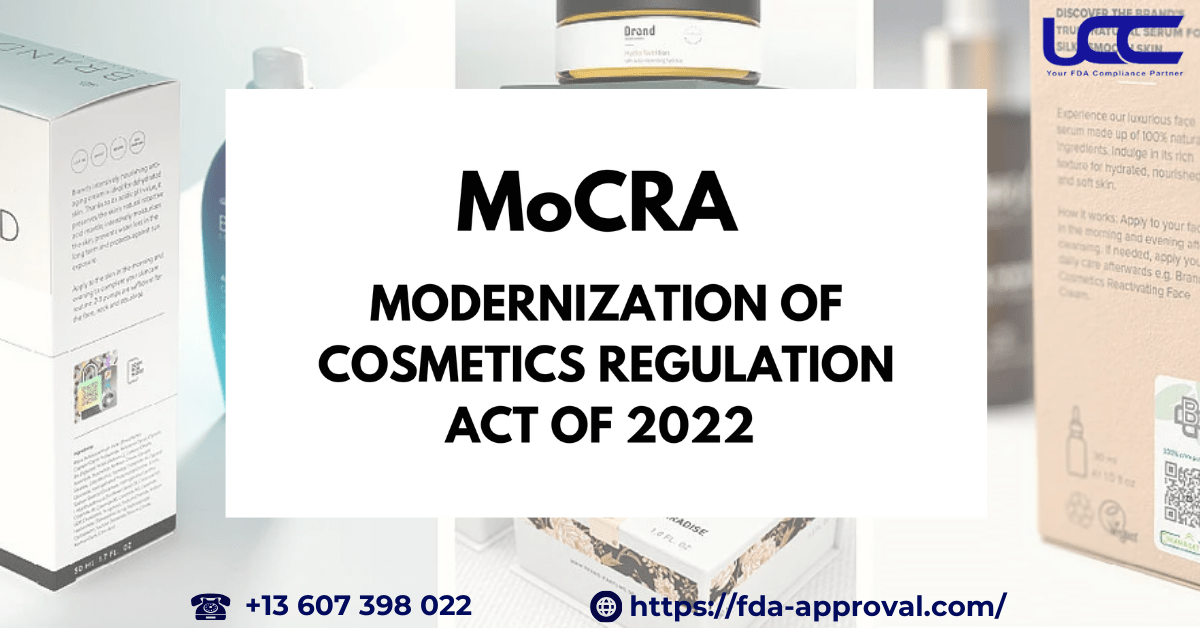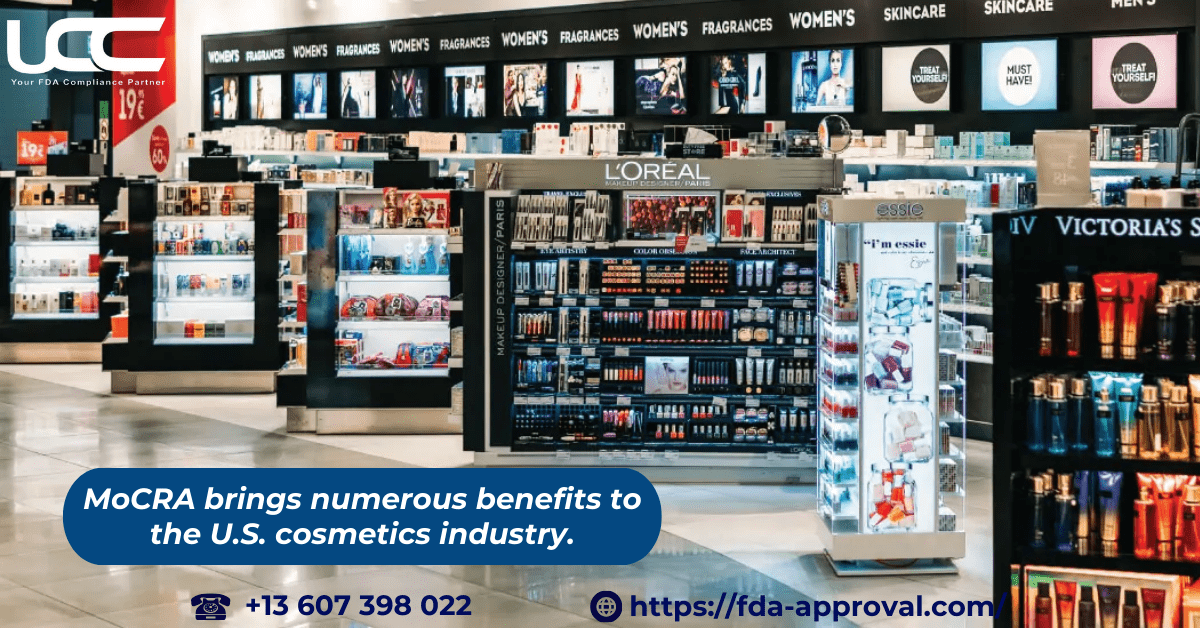The Modernization of Cosmetic Regulation Act (MoCRA), signed into law on December 29, 2022, represents a significant turning point for the cosmetics industry in the United States. As the cosmetics sector adapts to these new requirements, understanding the implications of MoCRA Cosmetic will be essential for manufacturers, consumers, and stakeholders. In this article, UCC will provide an overview of MoCRA and its impact on the industry.

1. An Overview of MoCRA Cosmetic
On December 29, 2022, the Modernization of Cosmetic Regulation Act (MoCRA) was signed into law by President Joe Biden. This legislation significantly impacts the cosmetics industry in the United States. MoCRA establishes a comprehensive regulatory framework that updates the registration and listing requirements set forth by the FDA. In other words, MoCRA represents a substantial update compared to the original Federal Food, Drug, and Cosmetic Act (FDCA) enacted in 1938. Moreover, MoCRA will take effect on December 29, 2023.

Based on information obtained by UCC, this act was included in Section 3501 of the Food and Drug Omnibus Reform Act of 2022 (FDORA) within the Consolidated Appropriations Act of 2023. Additionally, it expands the FDA’s authority in the beauty and personal care sector. As a result, the FDA will require cosmetic manufacturers to register their facilities and list their products.
2. Benefits of MoCRA Cosmetic
MoCRA brings numerous benefits to the U.S. cosmetics industry, including the following:
-
Uniform Regulations
MoCRA supersedes all state and local laws related to cosmetics. This includes product listing, adverse event reporting, facility registration, recordkeeping, GMP, recalls, and safety demonstrations. The authority of MoCRA also overrides existing state laws, such as the California Safe Cosmetics Program (CSCP). Consequently, it creates a uniform regulatory framework nationwide, reducing the complexity of compliance across various states, counties, or municipalities.
-
Enhanced Safety Oversight
MoCRA requires cosmetic manufacturers to conduct safety assessments of their products before market release. This ensures that all ingredients are evaluated for safety, minimizing the risk of harmful substances entering the market and affecting consumer health. Importantly, MoCRA mandates manufacturers to report any adverse events related to their products. As a result, the FDA can monitor product safety more effectively and respond swiftly to potential risks, thus enhancing consumer protection.
-
Ingredient Transparency
Under MoCRA, cosmetic products must clearly list all ingredients on their packaging. This includes the specific disclosure of common allergens. Such transparency enables consumers to make informed decisions, particularly those with allergies or sensitivities.
-
Improved Regulatory Oversight
Since 2022, cosmetic manufacturers are required to register their facilities with the FDA. This measure establishes a centralized database, improving regulatory oversight and facilitating product tracking in case of recalls or safety issues.
-
Strengthened FDA Authority
As previously mentioned, MoCRA reinforces the FDA’s authority. This enables regular inspections of manufacturing facilities and ensures compliance with safety standards. Furthermore, the FDA has the power to recall products that do not meet established requirements.

3. Key Changes Introduced by MoCRA Cosmetic
- Mandatory Facility Registration: All facilities producing and processing cosmetics for the U.S. market must register with the FDA, regardless of their location. Companies engaged solely in labeling and distribution are exempt from this requirement.
- Comprehensive Listing Product: Manufacturers, packers, and distributors must list their products with the FDA. This includes information such as ingredients, raw materials, fragrances, colors, manufacturing locations, and contact details.
- Recordkeeping Obligations: MoCRA imposes stricter recordkeeping requirements related to product safety and adverse event reporting. The FDA can access and copy relevant cosmetic records under specific conditions.
- New Labeling Requirements: The act introduces new labeling mandates, including listing allergens and providing contact information on product labels or packaging. This facilitates consumer reporting of adverse effects. Additionally, products intended for professional use must be clearly labeled.
- Product Recall Authority: The FDA has the authority to mandate recalls of cosmetic products that may cause serious injury or death.
- Good Manufacturing Practice (GMP) requirements: MoCRA mandates Good Manufacturing Practices (GMP) for cosmetics in accordance with national and international standards, ensuring product quality and safety for consumers.
4. How to Best Comply with MoCRA Cosmetic?
The authority granted to the FDA by MoCRA significantly impacts the U.S. market. Therefore, compliance with all requirements of this act is crucial for ensuring your products reach the U.S. market without issues. If you are unsure where to start, UCC can assist you.
UCC is a leading entity in providing FDA certification, boasting over 15 years of experience in the industry. Besides, UCC is prepared to handle challenges promptly and efficiently.. Furthermore, UCC can support you in meeting FDA and MoCRA regulations to ensure your products successfully enter the U.S. market. Contact UCC today for specific requirements regarding FDA registration for cosmetics.

Through this article, UCC hopes to provide you with valuable insights into MoCRA and clarify the essential requirements. UCC group wish your business continued success in the future!



